(完整版)主动语态变被动语态专项练习A4讲解
- 格式:doc
- 大小:78.52 KB
- 文档页数:10
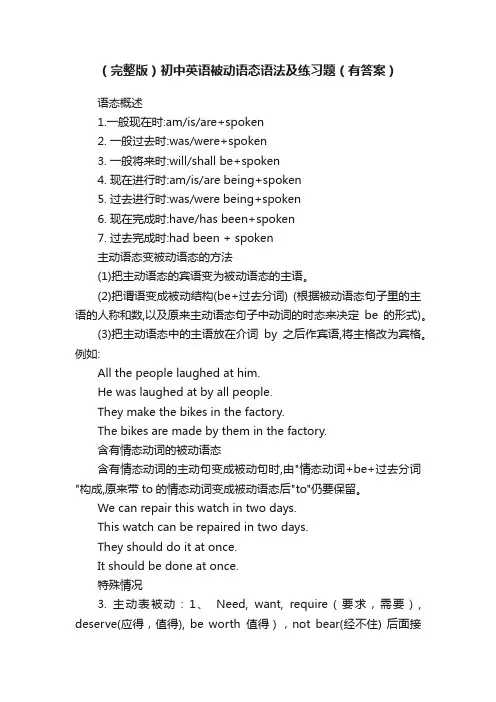
(完整版)初中英语被动语态语法及练习题(有答案)语态概述1.一般现在时:am/is/are+spoken2. 一般过去时:was/were+spoken3. 一般将来时:will/shall be+spoken4. 现在进行时:am/is/are being+spoken5. 过去进行时:was/were being+spoken6. 现在完成时:have/has been+spoken7. 过去完成时:had been + spoken主动语态变被动语态的方法(1)把主动语态的宾语变为被动语态的主语。
(2)把谓语变成被动结构(be+过去分词) (根据被动语态句子里的主语的人称和数,以及原来主动语态句子中动词的时态来决定be的形式)。
(3)把主动语态中的主语放在介词by之后作宾语,将主格改为宾格。
例如:All the people laughed at him.He was laughed at by all people.They make the bikes in the factory.The bikes are made by them in the factory.含有情态动词的被动语态含有情态动词的主动句变成被动句时,由"情态动词+be+过去分词"构成,原来带to的情态动词变成被动语态后"to"仍要保留。
We can repair this watch in two days.This watch can be repaired in two days.They should do it at once.It should be done at once.特殊情况3. 主动表被动:1、Need, want, require(要求,需要), deserve(应得,值得), be worth值得),not bear(经不住) 后面接doing主动表被动。
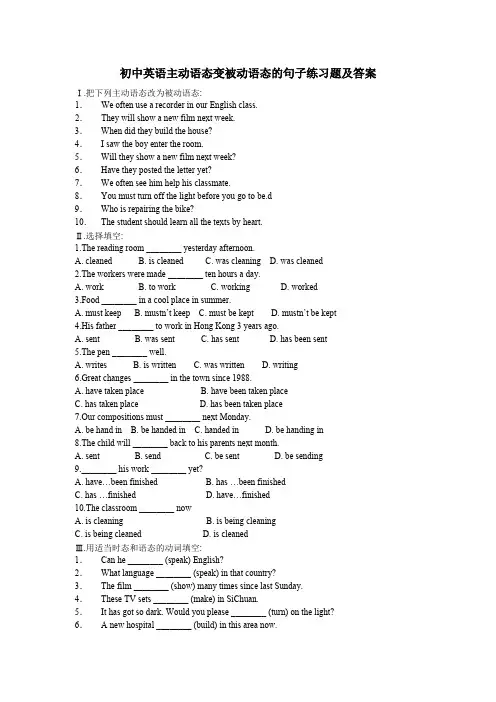
初中英语主动语态变被动语态的句子练习题及答案Ⅰ.把下列主动语态改为被动语态:1.We often use a recorder in our English class.2.They will show a new film next week.3.When did they build the house?4.I saw the boy enter the room.5.Will they show a new film next week?6.Have they posted the letter yet?7.We often see him help his classmate.8.You must turn off the light before you go to be.d9.Who is repairing the bike?10.The student should learn all the texts by heart.Ⅱ.选择填空:1.The reading room ________ yesterday afternoon.A. cleanedB. is cleanedC. was cleaningD. was cleaned2.The workers were made ________ ten hours a day.A. workB. to workC. workingD. worked3.Food ________ in a cool place in summer.A. must keepB. mustn’t keepC. must be keptD. mustn’t be kept4.His father ________ to work in Hong Kong 3 years ago.A. sentB. was sentC. has sentD. has been sent5.The pen ________ well.A. writesB. is writtenC. was writtenD. writing6.Great changes ________ in the town since 1988.A. have taken placeB. have been taken placeC. has taken placeD. has been taken place7.Our compositions must ________ next Monday.A. be hand inB. be handed inC. handed inD. be handing in8.The child will ________ back to his parents next month.A. sentB. sendC. be sentD. be sending9.________ his work ________ yet?A. have…been finishedB. has …been finishedC. has …finishedD. have…finished10.The classroom ________ nowA. is cleaningB. is being cleaningC. is being cleanedD. is cleanedⅢ.用适当时态和语态的动词填空:1.Can he ________ (speak) English?2.What language ________ (speak) in that country?3.The film ________ (show) many times since last Sunday.4.These TV sets ________ (make) in SiChuan.5.It has got so dark. Would you please ________ (turn) on the light?6. A new hospital ________ (build) in this area now.1.________ the book ________ (return).2.Rice ________ (grow) in the south.3.The window ________ (not break) by the boy.4.I ________ (tell) he ________ (not come) just now.Ⅳ.将下列句子改为被动语态,并根据情况保留或去掉动作的执行者1. They will say nothing more about this matter.2. They have made some flowers of silk.3. He wrote a poem.4. The students are planting some trees and flowers.5. They are to open up a new business next week.6. Children couldn’t have done all this damage.7. All of us will see him off at the airport.8. They feed the tigers at the zoo three times a day.9. You must hand in your homework before five.10. People say that she is a good teacher.Ⅴ. 用所给动词的正确形式填空1. English ________ (speak) in many countries.2. Information in short-term memory ________ (can, not, keep) very long.3. After that, one of the lights _______ (turn off) and the rat had to wait for a short time.4. Just a few years ago, tomatoes _______ (believe) to have magical powers, making people who ate them fall in love.5. It is said new copies of the book _______ (print) now.6. The old house _______ (pull) down next month.7. In the old days, the children _______ (take care of) by the mother because she did not work outside the house.8. Needless to say, the second list of words ___ (can, remember) more easily than the first one.9. She _______ (send) to another village when I got there.10. The teacher said that we _________ (give) another chance some time next month if we failed in the exam.参考答案I、1.A recorder is often used in our English class.2.A new film will be shown by then next week.3.When was the house built by them?4.The boy was seen to enter the room.5.Will a new film be shown by them next week?7.He is often seen to help his classmate.8.The light must be turned off before you go to bed.9.Who is the bike being repaired by?(By whom is the bike being repaired?)10.All the texts should be learned by heart by the students.II、1.D2.B3.C4.B5.A6.A7.B8.C9.B 10.CIII、1.speak2.is spoken3.has been shown4.are made5.turn6.is being built7.Has returned 8.is grown 9.wasn’t broken10.was told didn’t comeⅣ.1. Nothing more will be said about this matter.2. Some flowers of silk have been made by them.3. A poem was written by him.4. Some trees and flowers are being planted by the students.5. A new business is to be opened up next week.6. All this damage couldn’t have been done by children.7. He will be seen off at the airport by all of us.8. The tigers at the zoo are fed three times a day (by them).9. Your homework must be handed in before five (by you).10. It is said that she is a good teacher. (That she is a good teacher is said by them.)Ⅴ. 1. is spoken 2. cannot be kept 3. was turned off 4. were believed5. are being printed6. will be pulled7. were taken care of8. can be remembered 9. had been sent 10. would be given。
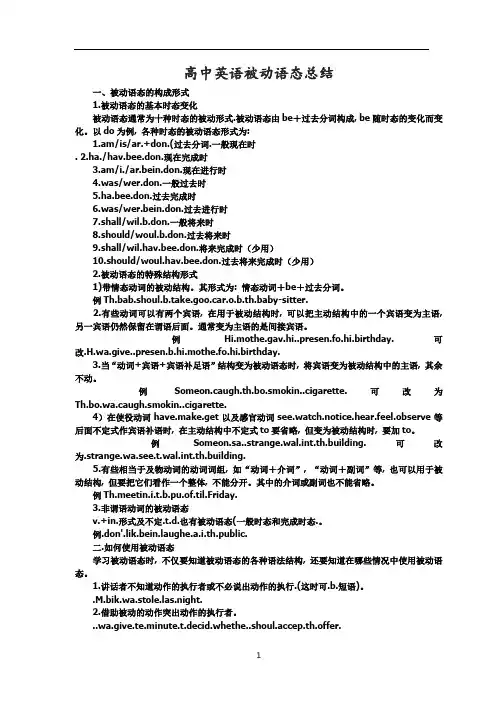
高中英语被动语态总结一、被动语态的构成形式1.被动语态的基本时态变化被动语态通常为十种时态的被动形式.被动语态由be+过去分词构成, be随时态的变化而变化。
以do为例, 各种时态的被动语态形式为:1.am/is/ar.+don.(过去分词.一般现在时. 2.ha./hav.bee.don.现在完成时3.am/i./ar.bein.don.现在进行时4.was/wer.don.一般过去时5.ha.bee.don.过去完成时6.was/wer.bein.don.过去进行时7.shall/wil.b.don.一般将来时8.should/woul.b.don.过去将来时9.shall/wil.hav.bee.don.将来完成时(少用)10.should/woul.hav.bee.don.过去将来完成时(少用)2.被动语态的特殊结构形式1)带情态动词的被动结构。
其形式为: 情态动词+be+过去分词。
例Th.bab.shoul.b.take.goo.car.o.b.th.baby-sitter.2.有些动词可以有两个宾语, 在用于被动结构时, 可以把主动结构中的一个宾语变为主语, 另一宾语仍然保留在谓语后面。
通常变为主语的是间接宾语。
例Hi.mothe.gav.hi..presen.fo.hi.birthday.可改.H.wa.give..presen.b.hi.mothe.fo.hi.birthday.3.当“动词+宾语+宾语补足语”结构变为被动语态时, 将宾语变为被动结构中的主语, 其余不动。
例Someon.caugh.th.bo.smokin..cigarette.可改为Th.bo.wa.caugh.smokin..cigarette.4)在使役动词have.make.get以及感官动词see.watch.notice.hear.feel.observe等后面不定式作宾语补语时, 在主动结构中不定式to要省略, 但变为被动结构时, 要加to。
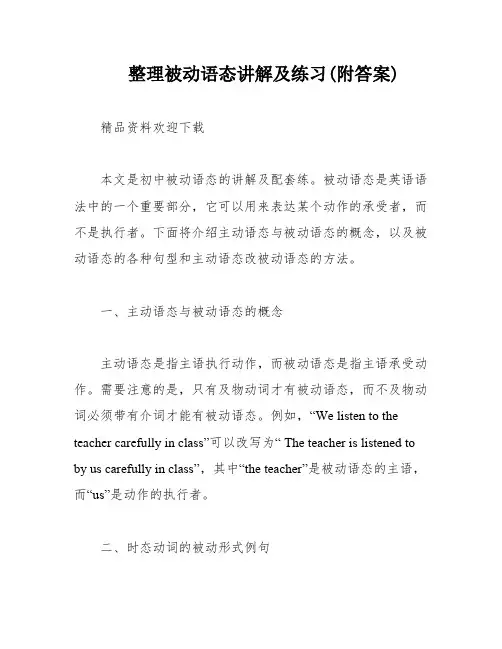
整理被动语态讲解及练习(附答案)精品资料欢迎下载本文是初中被动语态的讲解及配套练。
被动语态是英语语法中的一个重要部分,它可以用来表达某个动作的承受者,而不是执行者。
下面将介绍主动语态与被动语态的概念,以及被动语态的各种句型和主动语态改被动语态的方法。
一、主动语态与被动语态的概念主动语态是指主语执行动作,而被动语态是指主语承受动作。
需要注意的是,只有及物动词才有被动语态,而不及物动词必须带有介词才能有被动语态。
例如,“We listen to the teacher carefully in class”可以改写为“ The teacher is listened to by us carefully in class”,其中“the teacher”是被动语态的主语,而“us”是动作的执行者。
二、时态动词的被动形式例句被动语态可以用于各种时态,例如一般现在时、一般过去时、一般将来时、现在进行时、过去进行时、现在完成时、过去完成时和过去将来时等。
例如,“He is asked to do this”是一般现在时的被动语态,而“the story was told by her mother”是一般过去时的被动语态。
三、被动语态的各种句型被动语态有肯定句、否定句、一般疑问句和特殊疑问句等多种句型。
例如,“The song is liked by young people”是肯定句的被动语态,而“the song isn't liked by young people”是否定句的被动语态。
四、主动语态改被动语态的方法将主动语态改为被动语态的方法分为三步:将原句中的宾语改为主语,将动词改为变动形式be done(同时注意时态),将原来的主语(如果需要的话)放在介词by后面,以指明做事的人或物,如果没有必要则省去。
例如,“The man killed a tiger”可以改写为“a tiger was killed by the man”。
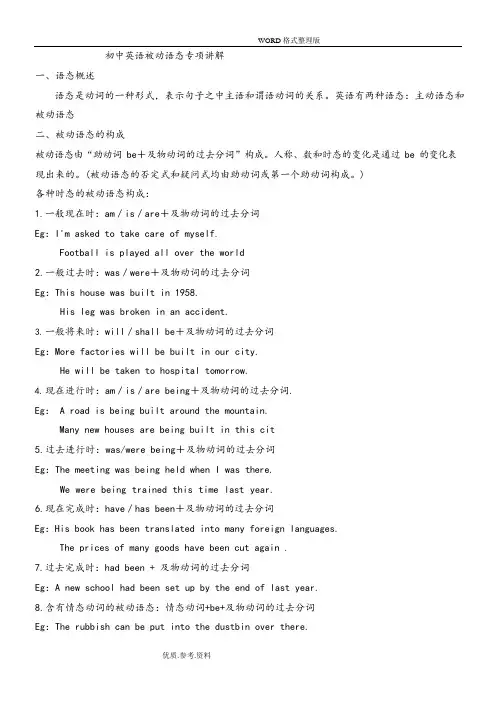
初中英语被动语态专项讲解一、语态概述语态是动词的一种形式,表示句子之中主语和谓语动词的关系。
英语有两种语态:主动语态和被动语态二、被动语态的构成被动语态由“助动词 be+及物动词的过去分词”构成。
人称、数和时态的变化是通过 be 的变化表现出来的。
(被动语态的否定式和疑问式均由助动词或第一个助动词构成。
)各种时态的被动语态构成:1.一般现在时:am/is/are+及物动词的过去分词Eg:I'm asked to take care of myself.Football is played all over the world2.一般过去时:was/were+及物动词的过去分词Eg:This house was built in 1958.His leg was broken in an accident.3.一般将来时:will/shall be+及物动词的过去分词Eg:More factories will be built in our city.He will be taken to hospital tomorrow.4.现在进行时:am/is/are being+及物动词的过去分词.Eg: A road is being built around the mountain.Many new houses are being built in this cit5.过去进行时:was/were being+及物动词的过去分词Eg:The meeting was being held when I was there.We were being trained this time last year.6.现在完成时:have/has been+及物动词的过去分词Eg:His book has been translated into many foreign languages.The prices of many goods have been cut again .7.过去完成时:had been + 及物动词的过去分词Eg:A new school had been set up by the end of last year.8.含有情态动词的被动语态:情态动词+be+及物动词的过去分词Eg:The rubbish can be put into the dustbin over there.4.含有情态动词的被动语态含有情态动词的主动语态变成被动语态时,由“情态动词+be+过去分词”构成,原来带 to 的情态动词变成被动语态后“to”仍要保留。
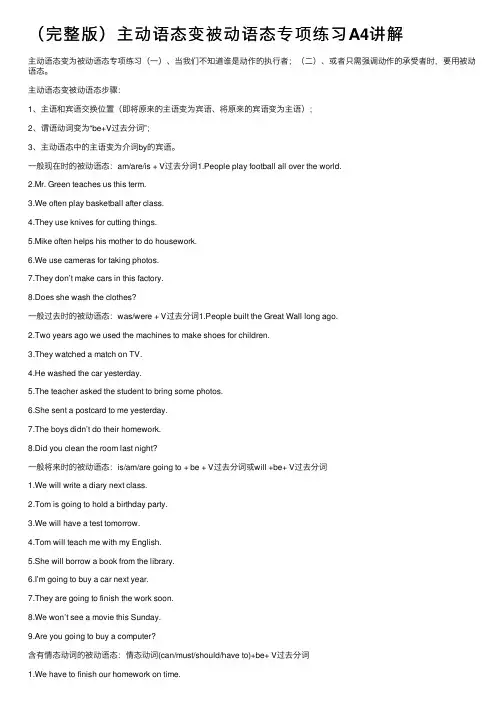
(完整版)主动语态变被动语态专项练习A4讲解主动语态变为被动语态专项练习(⼀)、当我们不知道谁是动作的执⾏者;(⼆)、或者只需强调动作的承受者时,要⽤被动语态。
主动语态变被动语态步骤:1、主语和宾语交换位置(即将原来的主语变为宾语、将原来的宾语变为主语);2、谓语动词变为“be+V过去分词”;3、主动语态中的主语变为介词by的宾语。
⼀般现在时的被动语态:am/are/is + V过去分词1.People play football all over the world.2.Mr. Green teaches us this term.3.We often play basketball after class.4.They use knives for cutting things.5.Mike often helps his mother to do housework.6.We use cameras for taking photos.7.They don’t make cars in this factory.8.Does she wash the clothes?⼀般过去时的被动语态:was/were + V过去分词1.People built the Great Wall long ago.2.Two years ago we used the machines to make shoes for children.3.They watched a match on TV.4.He washed the car yesterday.5.The teacher asked the student to bring some photos.6.She sent a postcard to me yesterday.7.The boys didn’t do their homework.8.Did you clean the room last night?⼀般将来时的被动语态:is/am/are going to + be + V过去分词或will +be+ V过去分词1.We will write a diary next class.2.Tom is going to hold a birthday party.3.We will have a test tomorrow.4.Tom will teach me with my English.5.She will borrow a book from the library.6.I’m going to buy a car next year.7.They are going to finish the work soon.8.We won’t see a movie this Sunday.9.Are you going to buy a computer?含有情态动词的被动语态:情态动词(can/must/should/have to)+be+ V过去分词1.We have to finish our homework on time.2.You must hand in your homework on time.3.We should plant more trees.4.He could play the violin when he was 7.5.We should speak to the old man politely.6.Parents should allow children to choose their own clothes.7.We can’t see the sun at night.带有双宾语(宾语既有⼈⼜有物)的被动语态:(1)将间接宾语(⼈)变为主语,直接宾语(物)不变。
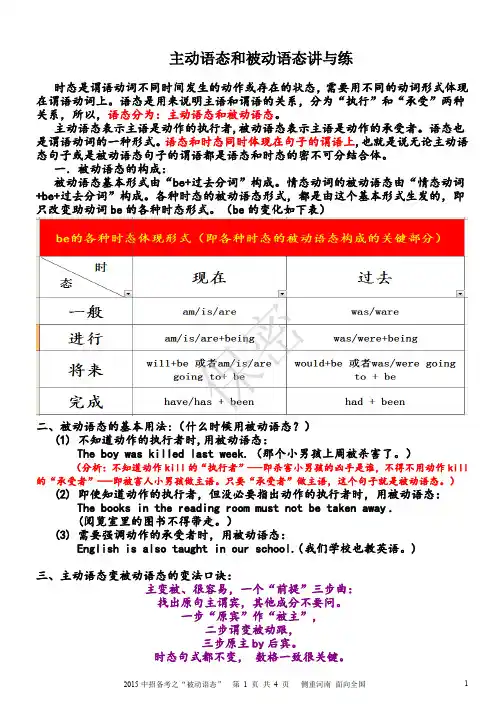
主动语态和被动语态讲与练时态是谓语动词不同时间发生的动作或存在的状态,需要用不同的动词形式体现在谓语动词上。
语态是用来说明主语和谓语的关系,分为“执行”和“承受”两种关系,所以,语态分为:主动语态和被动语态。
主动语态表示主语是动作的执行者,被动语态表示主语是动作的承受者。
语态也是谓语动词的一种形式。
语态和时态同时体现在句子的谓语上,也就是说无论主动语态句子或是被动语态句子的谓语都是语态和时态的密不可分结合体。
一.被动语态的构成:被动语态基本形式由“be+过去分词”构成。
情态动词的被动语态由“情态动词+be+过去分词”构成。
各种时态的被动语态形式,都是由这个基本形式生发的,即只改变助动词be的各种时态形式。
(be的变化如下表)密保二、被动语态的基本用法:(什么时候用被动语态?)(1) 不知道动作的执行者时,用被动语态:The boy was killed last week.(那个小男孩上周被杀害了。
)(分析:不知道动作kill的“执行者”---即杀害小男孩的凶手是谁,不得不用动作kill 的“承受者”---即被害人小男孩做主语。
只要“承受者”做主语,这个句子就是被动语态。
)(2) 即使知道动作的执行者,但没必要指出动作的执行者时,用被动语态:The books in the reading room must not be taken away.(阅览室里的图书不得带走。
)(3) 需要强调动作的承受者时,用被动语态:English is also taught in our school.(我们学校也教英语。
)三、主动语态变被动语态的变法口诀:主变被、很容易,一个“前提”三步曲:找出原句主谓宾,其他成分不要问。
一步“原宾”作“被主”,二步谓变被动跟,三步原主by后宾。
时态句式都不变,数格一致很关键。
注意:1.主动、被动的时态要一致。
2.主动、被动的句式要一致。
3.变成的被动语态的主语与谓语在单复数上保持一致。
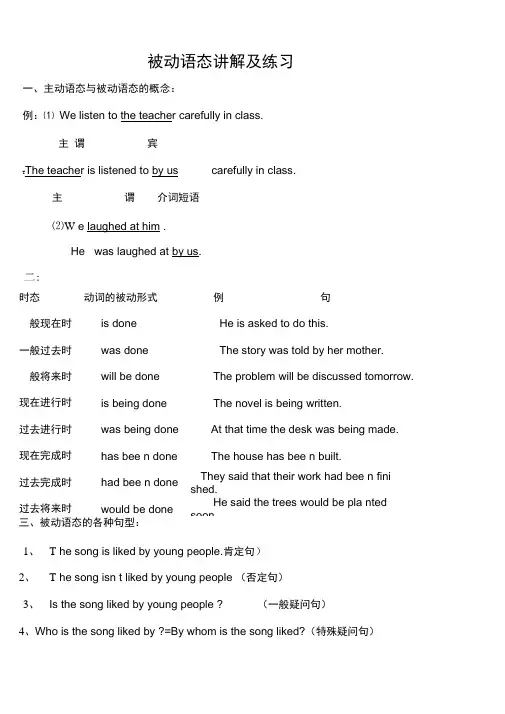
被动语态讲解及练习一、主动语态与被动语态的概念:例:⑴ We listen to the teacher carefully in class.主谓宾T The teacher is listened to by us主谓介词短语⑵W e laughed at him .时态动词的被动形式例句般现在时is done He is asked to do this.一般过去时was done The story was told by her mother.般将来时will be done The problem will be discussed tomorrow. 现在进行时is being done The novel is being written.过去进行时was being done At that time the desk was being made.现在完成时has bee n done The house has bee n built.过去完成时had bee n doneThey said that their work had bee n finished.过去将来时would be doneHe said the trees would be pla ntedsoon.三、被动语态的各种句型:1、T he song is liked by young people.肯定句)2、T he song isn t liked by young people (否定句)3、Is the song liked by young people ? (一般疑问句)4、Who is the song liked by ?=By whom is the song liked?(特殊疑问句)He was laughed at by us.carefully in class.四、主动语态改被动语态的方法:方法分为三步:⑴把原句中的宾语改成主语⑵动词改为变动形式be done同时注意时态)⑶原来的主语如果需要的话放在介词by 后面,以指明做事的人或物,如果没有必要则省去例:The man killed a tiger.f A tiger was killed by the man .(改的过程中要注意时态和语态两个方面)五、特殊句型的被动语态:1 含有使役动词(make /let /have)或感官动词(hear ,see, listen to ,look at find ,watch,feel等)的句子,在主动语态中这些词后常跟不带to的动词不定式,但是在改成被动语态时,则一定要把省去的to再加上去,另外help这一个词在主动语态中后面的动词不定式可以带to,也可不带to,但在被动语态中也必须把to加上去。

被动语态练习一、把下列句子从主动语态改成被动语态1.Mr. Green delivers our mail.2.The children have eaten the cake.3.Linda wrote that letter last night.4.The jeweler is going to fix my watch.5.Ms. Bond will teach our class next term.6.They are repairing the car in the garage.7.That company employs many people.8.Has anybody fed the birds?9.The sectetary is going to type the letters.10.A high school student bought my old car.11.They won’t hold the meeting until next Friday.12.You must not take these magazines out of the reading-room.13.Everyone knows this fact very well.14.Could you carry out the plan on time?15.You must finish the work by sever o’clock.16.The tiger in the zoo frightened the little girl.17.They gave him a medal for his wonderful work.18.The doctor will ask the patient some questions before he give her medicine.19.They made the young head of the volleyball team.20.Someone will tell you how to prepare for the examination.21.They criticized me for something wrong that I had done.22.It surprised me to hear that they wouldn’t give him a holiday after his hard work.23.They are making this type of radios in Shanghai.24.Someone is showing them how to operate the computers.25.Have you paid attention to such problems.26.You should put forward the questions at the meeting.27.People are talking about the incident all over the town.28.They elected her leader of the group.29.They had to put off the sports meet because of the rain.30.We don’t have to write it in such a hurry.31.They believe that this engine is twice as powerful as the previous one.32.Someone saw him pick up the gun.33.They say that the rocket traveled six thousand miles and landed in the target area.34.They are to send letters to the leaders of charitable organizations.35.Before they invented printing people had to write everything by hand.36.Normally men sweep this street every day, but nobody swept it last week.37.Someone left this purse in classroom yesterday; the cleaner found it..38.We serve hot meals till 10:30 , and guests can order coffee and sandwiches up to 11:30 .39.You can’t wash this dress; you must dry-clean it.40.They waste a lot of time discussing unimportant things.41.They are repairing my piano at the moment.42.Visitors must leave umbrellas and sticks in the cloakroom.43.We have to pick the fruit very early in the morning; otherwise we can’t get it to the market in time.。
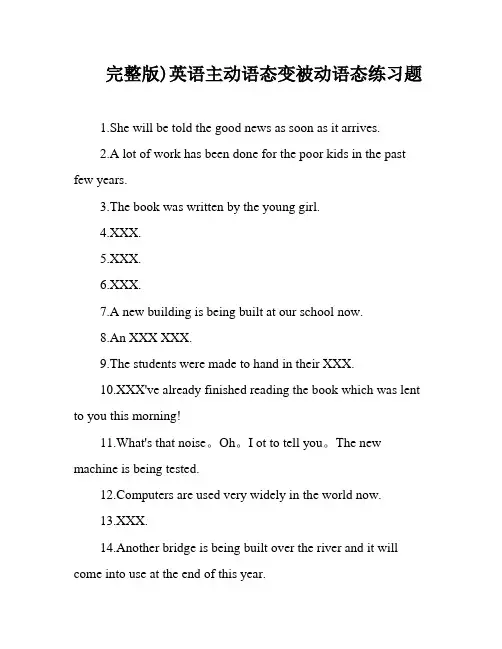
完整版)英语主动语态变被动语态练习题1.She will be told the good news as soon as it arrives.2.A lot of work has been done for the poor kids in the past few years.3.The book was written by the young girl.4.XXX.5.XXX.6.XXX.7.A new building is being built at our school now.8.An XXX XXX.9.The students were made to hand in their XXX.10.XXX've already finished reading the book which was lent to you this morning!11.What's that noise。
Oh。
I ot to tell you。
The new machine is being tested.puters are used very widely in the world now.13.XXX.14.Another bridge is being built over the river and it will come into use at the end of this year.XXX: XXX.Passive: The windows are XXX.2.XXX XXX.XXX: XXX.Passive: XXX XXX.3.The book will be read by me tonight. XXX: I will read the book tonight. Passive: The book will be read by me tonight.4.The car was XXX.XXX: XXX.Passive: The car was XXX.5.The letter was written by John.XXX: XXX.Passive: The letter was written by John.1.She did not clean the room this morning.2.Is English XXX?3.XXX.4.XXX.5.What did they find?6.Bob XXX.7.XXX his children.8.I am called Xiao Wang by everyone.9.Mary is XXX.10.She is unable to compose such fine music.11.XXX.12.He has not received the letter.13.XXX I arrived.14.XXX.15.We often heard him singing.16.My father made me go there alone.17.XXX XXX.Passive to Active:1.We helped an old man cross the street.2.We did not help an old man cross the street.3.Bob saw Jenny come out of the classroom.4.Did Danny see Jenny come out of the classroom?5.I often send emails to Bob.6.I sent an email to Tom XXX.7.His XXX fishing.8.XXX.9.This factory produces machine tools.10.They should do it immediately.11.It's possible that you will be disappointed.12.Frank was the name given to the child.13.Do we often sing this song?14.His XXX.15.Her house will not be sold in the near future.16.Whose machine is he repairing?17.XXX work?18.Everyone XXX.19.Is there anything that can be done to help her?21.He did not give me some old magazines.22.He did not tell me to wait for him at the gate.23.The poor were looked down upon during that time.24.XXX.25.You must pay n to your n.26.Nobody XXX.27.No n has been taken to clean the river.28.Who is the author of this novel?29.This nary has been in use for ten years.30.The classroom is always XXX.31.She is often heard singing.。
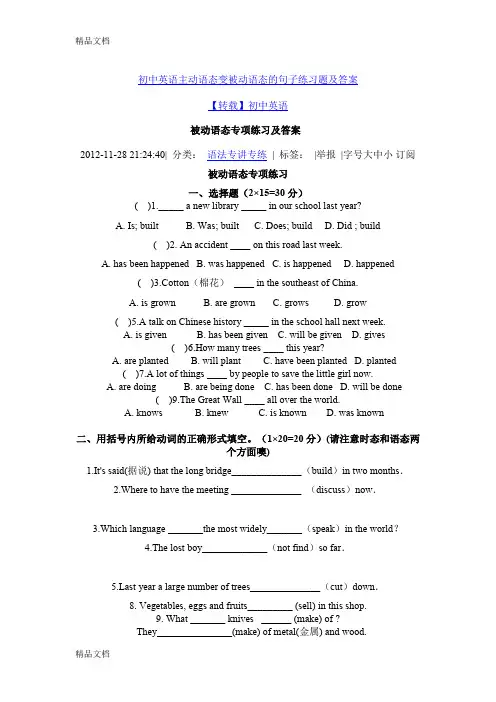
初中英语主动语态变被动语态的句子练习题及答案【转载】初中英语被动语态专项练习及答案2012-11-28 21:24:40| 分类:语法专讲专练| 标签:|举报|字号大中小订阅被动语态专项练习一、选择题(2×15=30分)( )1._____ a new library _____ in our school last year?A. Is; builtB. Was; builtC. Does; buildD. Did ; build( )2. An accident ____ on this road last week.A. has been happenedB. was happenedC. is happenedD. happened( )3.Cotton(棉花)____ in the southeast of China.A. is grownB. are grownC. growsD. grow( )5.A talk on Chinese history _____ in the school hall next week.A. is givenB. has been givenC. will be givenD. gives( )6.How many trees ____ this year?A. are plantedB. will plantC. have been plantedD. planted( )7.A lot of things ____ by people to save the little girl now.A. are doingB. are being doneC. has been doneD. will be done( )9.The Great Wall ____ all over the world.A. knowsB. knewC. is knownD. was known二、用括号内所给动词的正确形式填空。
主动语态变被动语态专题练习一、将下列主动语态的句子变为被动语态1.Teachers must take good care of the student.2. Was another man-made satellite sent up into the space by them last week.3.People plant many trees on either side of the street each year.4.Li Lei mended the bike.5. A famous American writer wrote the book Red Star Over China years ago.6.Two years ago we used that machine to make shoes for children.7. Ken is often heard to apologize to his teacher.8.People there didn’t plant any trees last year.9. We call him David.10.We will plant some trees in the garden this year.11. Do young people usually listen to pop music?12.We should help the disabled people.13. Jenny showed me the picture.14.My mother gave me a dictionary as a birthday present.15. We heard Jim playing the guitar in his room.二、单项选择1. Today, the forests have almost gone. People must ______ down too many trees.A. stop to cutB. stop from cuttingC. be kept cuttingD. be stopped from cutting2.He _____ in the classroom just now. He ______ be there now.A. heard to sing;mayB. was heard sing; mustC. heard sing; mustD. was heard to sing; may3. ---I want to teach in this area.---Well, teachers ______ very much here.A. needB. are needingC. are neededD. will need4. A report says hundreds of thousands of trees ______ in the Amzaon rainforest last year.A. was cut downB. have been cut downC. were cut downD. has been cut down5. ---What about the pen you bought yesterday?---It ______ well. I like it very well.A. was writtenB. is writtenC. wroteD. Writes6. ---Sixteen-year-olds _____ to drive.---I agree. They aren’t serious enough at that age.A. shouldn’t be allowedB. shouldn’t allowC. don’t allowD. are allowed not7. The village is building a school. I hope it _____ before August this year.A. FinishesB. will finishC. is finishedD. will be finished【形容词】形容词修饰名词,说明事物或人的性质或特征。
被动语态讲解一、被动语态的构成形式1. 被动语态的基本时态变化被动语态通常为十种时态的被动形式, 被动语态由be+过去分词构成,be随时态的变化而变化。
以do为例,各种时态的被动语态形式为:1) am/is/are +done (过去分词) 一般现在时例Visitors are requested not to touch the exhibits.2)has /have been done 现在完成时例All the preparations for the task have been completed, and we're ready to start.3)am/is /are being done 现在进行时例A new cinema is being built here.4)was/were done 一般过去时例I was given ten minutes to decide whether I should reject the offer.5)had been done 过去完成时例By the end of last year, another new gymnasium had been completed in Beijing.6)was/were being done 过去进行时例A meeting was being held when I was there.7)shall/will be done 一般将来时例Hundreds of jobs will be lost if the factory closes.8)should/would be done 过去将来时例The news would be sent to the soldier's mother as soon as it arrived.9)shall/will have been done 将来完成时(少用)例The project will have been completed before July.2. 被动语态的特殊结构形式1)带情态动词的被动结构。
被动语态一、语态概述英语中有两种语态:主动语态和被动语态。
主动语态表示主语是动作的执行者。
如:Many people speak English. 谓语:speak 的动作是由主语many people来执行的。
被动语态表示主语是动作的承受者,即行为动作的对象。
所谓“被动语态”,相当于中文中常说的“被……”、“由……”的句式,如:“他的自行车被偷了。
”,再如:English is spoken by many people. 主语English是动词speak的承受者。
判断:看下面的两个例句,你来判断哪个是主动哪个是被动?He opened the door.他开了门。
(____________)The door was opened.门被开了。
(____________)二、被动语态的构成: be动词+Vp.p被动特点强调宾,用be加上过去分。
行为对象作主语,逻辑主语by来引。
1. English is ___________(speak)in Canada.2. The blouse is ___________(make)of silk.3. English is ___________(speak)by many people.谁做的动作不知道,说出谁做的没必要。
动作承受者需强调,用被动语态莫忘了。
1. Some stamps were ___________(steal)last week.2. The PRC was ___________(found)on October 1, 1949.3. Football is ___________(play)in most middle schools.被动语态须留意,P.P前面助动be. be + P.Pam(is,are)现在时,am(is,are)+P.Pwas和were表过去。
was(were)+P.P完成have(has)been。
语态:英语的语态是通过动词形式的变化表现出来的。
主动语态和被动语态。
英语中有两种语态:主动语态表示主语是动作的执行者。
例如:Many people speak Chinese.谓语:speak的动作是由主语many people来执行的。
被动语态表示主语是动作的承受者,即行为动作的对象。
例如:Chinese is spoken by many people. 主语English是动词speak的承受者。
注意:只有及物动词才有被动语态。
一、被动语态的构成形式1. 被动语态的基本时态变化被动语态通常为十种时态的被动形式, 被动语态由be+过去分词构成,be随时态的变化而变化。
以do为例,各种时态的被动语态形式为:1) am/is/are +done (过去分词) 一般现在时例Visitors are requested not to touch the exhibits.练习 1 John, you can't go out to play until your homework _______.A. finishesB. has finishedC. is finishedD. was finished思路分析:本题考查的是一般现在时的被动语态。
作业是由某个人来完成的,因此用被动语态结构is finished,故选择C。
2 We will fly a kite as soon as your homework _______.A. finishesB. will be finishedC. has finishedD. is finished思路分析:本题考查的是一般现在时的被动语态。
在题干中,your homework作时间状语从句的主语,因此用被动语态结构,在时间状语从句中用一般现在时表将来,故选择D。
3.—Your classroom is very clean.—Yes, it ______ every day.A. is cleanedB. cleansC. is cleaningD. was cleaned思路分析:本题考查的是一般现在时的被动语态。
主动语态变被动语态的方法+习题主动语态变被动语态的方法一、主动语态和被动语态概说英语的语态分主动语态和被动语态,主动语态表示主语是动作的执行者,而被动语态则表示主语是动作的承受者。
被动语态由“助动词be+过去分词”构成:Everybody likes him. 大家都喜欢他。
(主动语态)He is liked by everybody. 他受到大家的喜欢。
(被动语态) 二、主动语态变被动语态的方法1. 主动语态变被动语态的基本方法将主动语态的宾语变为被动语态的主语,将主动谓语变为被动谓语(be+过去分词),将主动语态的主语变为by短语(在被动句中用作状语):He broke the cup. → The cup was broken by him.【注意】若不强调动词执行者,被动语态中的by短语通常可以省略: He was born in 1986. 他生于1986年。
What is this flower called? 这种花叫什么花?2. 双宾动词的被动语态双宾动词即指带双宾语的动词,它们在变为被动语态时,通常是把间接宾语(指人)变为被动语态的主语,而把直接宾语(指事物)保留下来(称为保留宾语):He answered me that question. → I was answered that question by him.有的动词则通常把直接宾语(指事物)变为被动语态的主语,而把间接宾语改为介词to 或for引起的状语(到底用to还是for,与所搭配的动词有关):He wrote her a letter. → A letter was written to her. (与动词write搭配用介词to) She made him a new coat. → A new coat was made for him. (与动词make搭配用介词for)有时以上两种方式均可用:He gave her some money.他给她一些钱。
被动语态一、概念:语态是动词的一种形式,它表示主语和谓语的关系。
语态有两种:主动语态和被动语态。
如果主语是动作的执行者,或者是说动作是由主语完成的,要用主动语态;如果主语是动作的承受者,或者是说动作不是由主语而是由其他人完成的,则用被动语态。
二、主动句变为被动句的步骤:1.把原主动句中的宾语变为被动句的主语2.把动词变为被动形式即be +过去分词,并注意其人称和数随主语的变化,而动词的时态则保持不变。
3.原主动句的主语如需要则放在by后面以它的宾格形式出现(注代词的宾格),如不需要则可省略。
4.其它的成分(定语、状语)不变。
三、被动语态的用法:1. 一般现在时的被动语态构成:is / am / are + 及物动词的过去分词We clean our classroom every day.My mother asks me to study hard.2. 一般过去时的被动语态构成:was / were + 及物动词的过去分词A new shop was built last year.3. 现在完成时的被动语态构成:has / have + been + 及物动词的过去分词This book has been translated into many languages.Many man-made satellites have been sent up into space by many countries.4. 一般将来时的被动语态构成:will+ be + 及物动词的过去分词A new hospital will be built in our city.Many more trees will be planted next year.5. 含有情态动词的被动语态构成:情态动词+ be + 及物动词的过去分词Young trees must be watered often. Your mistakes should be corrected right now.The door may be locked inside.Your homework can be handed in tomorrow.6. 现在进行时的被动语态构成:am / is / are + being + 及物动词的过去分词7. 不定式的被动语态:to + be + 及物动词的过去分词There are two books to be read.There are twenty more trees to be planted.3. 感官动词或使役动词使用省略to的动词不定式,主动语态中不带to ,但变为被动语态时,须加上to 。
主动语态变为被动语态专项练习(一)、当我们不知道谁是动作的执行者;(二)、或者只需强调动作的承受者时,要用被动语态。
主动语态变被动语态步骤:1、主语和宾语交换位置(即将原来的主语变为宾语、将原来的宾语变为主语);2、谓语动词变为“be+V过去分词”;3、主动语态中的主语变为介词by的宾语。
一般现在时的被动语态:am/are/is + V过去分词1.People play football all over the world.2.Mr. Green teaches us this term.3.We often play basketball after class.4.They use knives for cutting things.5.Mike often helps his mother to do housework.6.We use cameras for taking photos.7.They don’t make cars in this factory.8.Does she wash the clothes?一般过去时的被动语态:was/were + V过去分词1.People built the Great Wall long ago.2.Two years ago we used the machines to make shoes for children.3.They watched a match on TV.4.He washed the car yesterday.5.The teacher asked the student to bring some photos.6.She sent a postcard to me yesterday.7.The boys didn’t do their homework.8.Did you clean the room last night?一般将来时的被动语态:is/am/are going to + be + V过去分词或will +be+ V过去分词1.We will write a diary next class.2.Tom is going to hold a birthday party.3.We will have a test tomorrow.4.Tom will teach me with my English.5.She will borrow a book from the library.6.I’m going to buy a car next year.7.They are going to finish the work soon.8.We won’t see a movie this Sunday.9.Are you going to buy a computer?含有情态动词的被动语态:情态动词(can/must/should/have to)+be+ V过去分词1.We have to finish our homework on time.2.You must hand in your homework on time.3.We should plant more trees.4.He could play the violin when he was 7.5.We should speak to the old man politely.6.Parents should allow children to choose their own clothes.7.We can’t see the sun at night.带有双宾语(宾语既有人又有物)的被动语态:(1)将间接宾语(人)变为主语,直接宾语(物)不变。
(2)将直接宾语(物)变为主语,一般要在间接宾语前加介词to或for.1.He often gives me a flower.2.Yesterday my mother told me an interesting story.3.She will buy me a present.4.Mr Xu teaches us physics.5.We drew him a picture.6.He often makes me a postcard.7.I’ll buy him a big house.8.I usually hear her sing English songs in the morning.9.He makes her horse work all day.10.He makes her horse work all day.感官动词(make,let,have)和使役动词(see,look at,watch,notice,hear,listen to)变为被动语态时要把省略了的to还原出来。
感官动词:make sb do sthlet sb do sthhave sb do sth使役动词:see sb do sthlook sb do sthwatch sb do sthnotice sb do sthhear sb do sthlisten sb do sth1.I saw him fall off the tree.2.They saw the boy play basketball at 3:00 yesterday.3.I saw him enter the house.4.We clean our classroom every day.5.Many people speak Englsih.6.He washed his shoes yesterday.7.The boss makes the workers work 18 hours a day.8.He can write a great many letter with the computer.9.He has brought his book here.10.You must hand in your compositions after class.11.My aunt visited me to her dinner party.12.My uncle gave me a present on my birthday.13.We often hear him play the guitar.14.They bought ten computers last term.15.He bought his friend some fruits yesterday.16.They will finish the work in ten days.17.The foreign friends gave us some wonderful stamps.18.The teacher saked Tom to turn on the computer.19.You must take this medicine three times a day.20.Do they often talk about this question?( )21.Lily is a warm girl. We like to make friends with her.A. hotB. strangeC. friendlyD. heated( )lions of people are crazy about the World Cup.A. annoyed withB. excited aboutC. worried aboutD. satisfied with( )23.Mr Brown walks through the park and says hello to all of those he passes.A. look afterB. plays withC. watchesD. greets( )24.Work hard, or others will take your position.A. get your jobB. get your seatC. sit on your chairD. help do your job( )25.—I thank the best way to learn English is using it.— I can't agree more!A.I really agree with you.B.I don't think so.C.That sounds interesting.D.I don't use it anymore. ( )26.Is it _______ UFO or ______ alien?.A. a ; anB. a ; aC. an ; anD. an ; a( )27.The girl practices conversations with friends to improve her _______ skills.A. spoke B .speaks C. speaking D. writing ( )28. I'm not sure _______ I've met him before. A. whenB. ifC. howD. why( )29. A ____lazy man can't make______ money. A.much too,too much B.much too,much tooC.much too,too manyD.too much,too much ( )30.Our teacher told us ______________.A. what the earth travels around the sun.B. what the earth traveled around the sun.C. that the earth traveled around the sun.D. that the earth travels around the sun.( )31. The woman has long hair is our math teacher.A .whom B. who C. what D. which ( )32.She used to ________ in the morning, but now she is used to ______ at night.A. read ; readB. reading ; readingC. reading ; readD. read ; reading( )33.Tina's mother ________ Tina because she always comes to top in her class.A. is strict withB. worries aboutC. take pride inD. is proud in( ) 34.—_________ important invention the computer is!— I think so.A. What aB. HowC. What anD. How an ( ) 35._______ I _______ he _______ listening to western classical music.A. Not only ; but also ; enjoysB. Not only ; but also ; enjoyC. Both ; and ; enjoysD. Both ; and ; like to( )36.Attention, everyone. I have _______ to tell you.A.nothing seriousB.serious somethingC.something seriousD.serious nothing( )37.I don't know if Jack ______ tomorrow. If he ______ , call me, please.A.will come ; will comees ; comeC.will come ; comeses ; comes( )38. Children, you should remember: ______careful you are,_____mistakes you will make.A.The more ; the moreB.The fewer ; the moreC.The more ; the lessD.The more the fewer ( )39.—I will go to the countryside to see my grandmother this afternoon, so I can't go swimming with you.—____________.A. It's my pleasure.B. You are welcome.C. That's a pity.D. Sure, I am.。